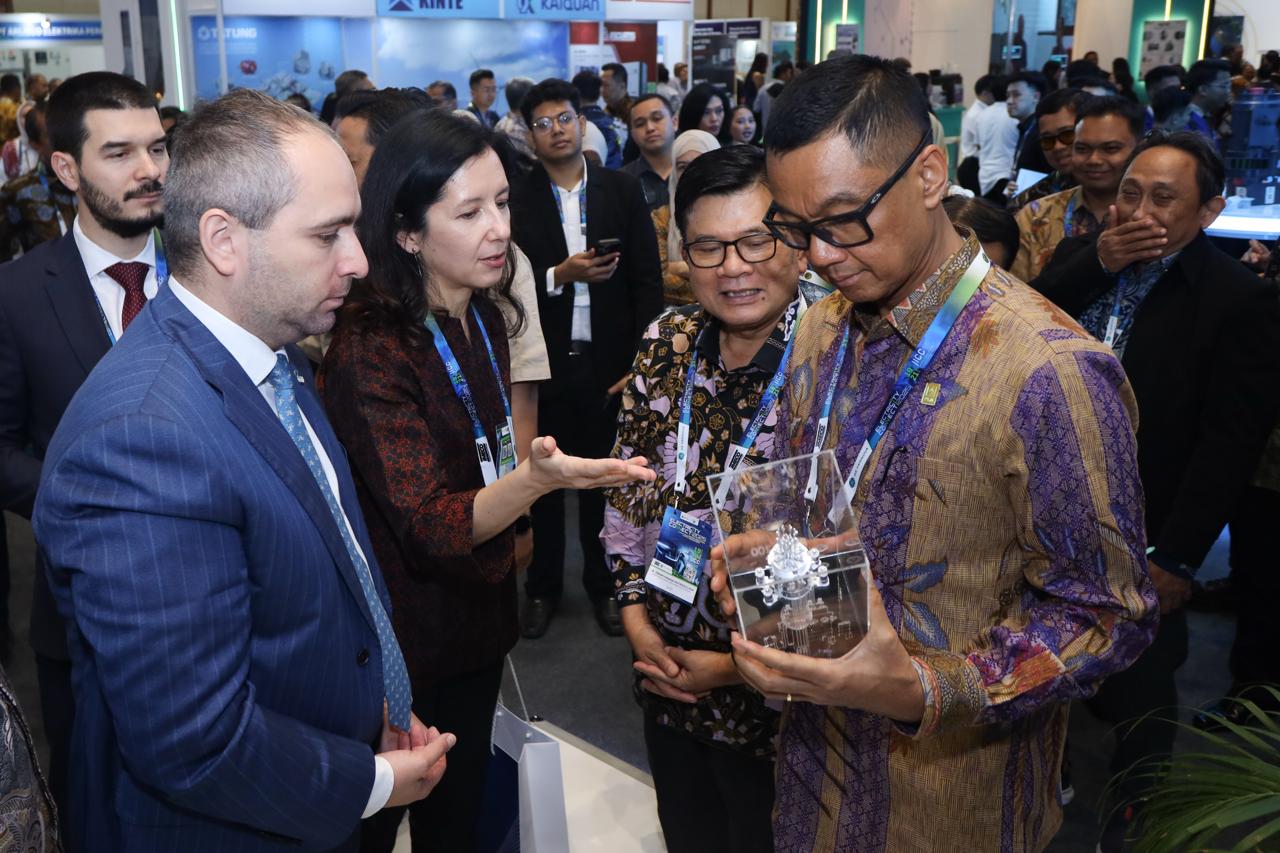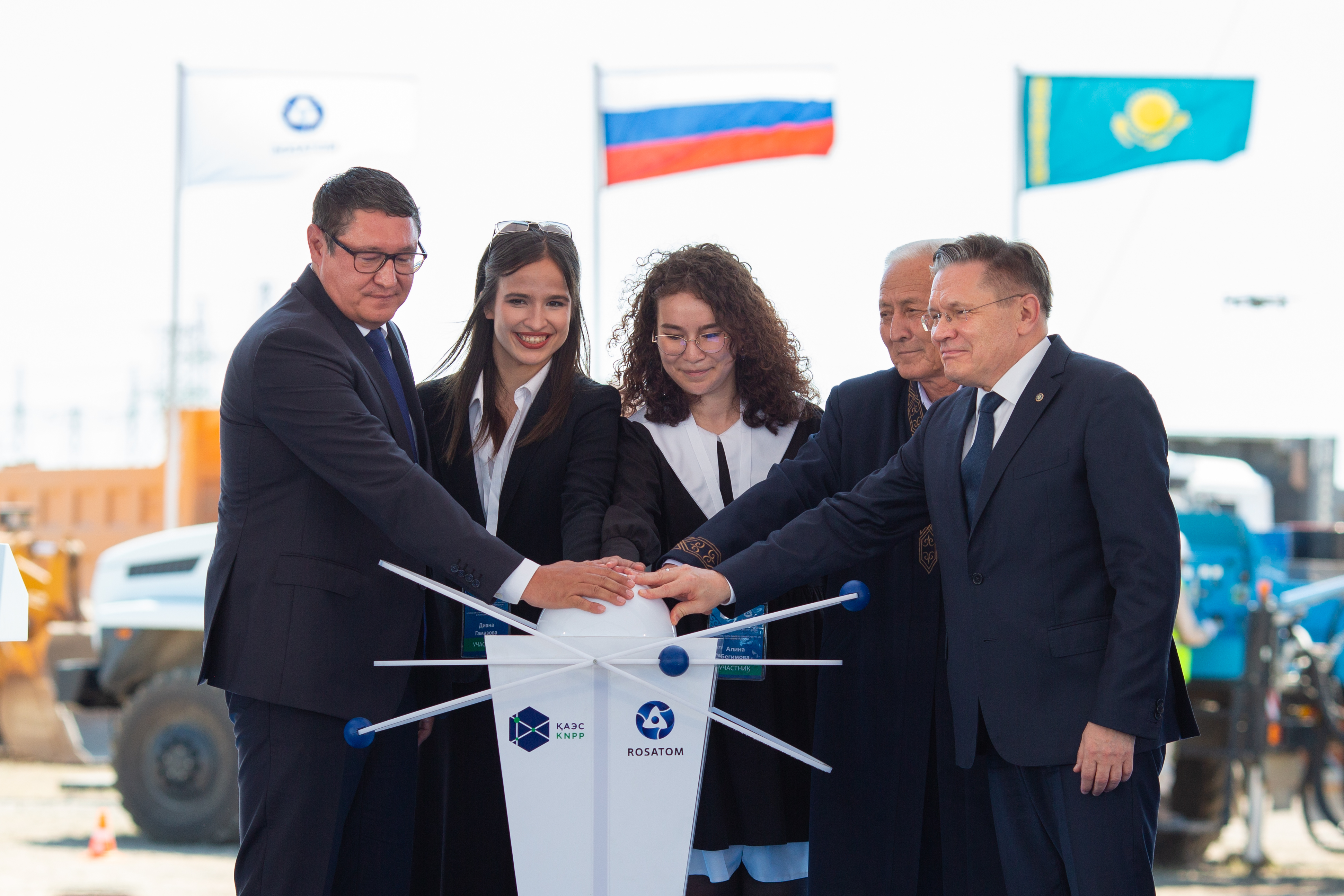The Institute of Nuclear Physics of the
Academy of Sciences of the Republic of Uzbekistan (INP AS RUz) has become a
member of the Consortium established around the MBIR, which is being built by
Rosatom in Dimitrovgrad (Ulyanovsk Region) as part of the national
technological leadership project “New Nuclear and Energy Technologies.”
The agreement was signed on July 16, 2025, at
the “ATOM” Museum by Vasily Konstantinov, General Director of the Consortium
Leader LLC “MCI MBIR” (part of the Rosatom State Corporation), and Ilham
Sadikov, Director of INP.
Participation of the Institute of Nuclear Physics in the international Consortium will grant access to advanced scientific research and developments related to the use of next-generation reactors. The Institute’s scientists will be able to contribute significantly to the planning of experiments, development of multilateral projects, and coordination of joint scientific activities. This event highlights the importance of partnership and international cooperation in achieving strategic goals for the sustainable development of energy, nuclear science, and technology.
"The development of advanced nuclear
technologies, including fourth-generation reactors, necessitates the creation
of modern research centers. Of particular importance are large-scale
"megascience" complexes like MBIR, which are unique facilities
contributing to a qualitatively new level of scientific advancement. The
accession of the Institute of Nuclear Physics of the Republic of Uzbekistan to
the Consortium will enrich both Russian and Uzbek science with new
opportunities. This primarily involves fundamental research in the experimental
confirmation of theoretical models of particle behavior and interactions under
extreme conditions, the testing of hypotheses regarding the nature of
fundamental forces and symmetries, as well as the search for new states of
matter and exotic phenomena. Thanks to joint work with the Joint Institute for
Nuclear Research, which joined the Consortium last year, as well as potential
project participants from China, Belarus, and other countries, MBIR is becoming
a platform for joint international research and development."
"The experiments conducted at the International Research Center will retain their significance and relevance even decades from now. Therefore, we are obligated to create conditions for future generations of researchers, ensuring access to innovative and economically viable technologies. MBIR plays a key role in training new scientific personnel—Russian and foreign specialists attracted to collaborate on projects. Thus, this international scientific center contributes to the development of cooperation among participating countries and extends far beyond the energy sector alone," noted Vasily Konstantinov.
"Today's signing opens new horizons for
cooperation between the Institute of Nuclear Physics of Uzbekistan and the
Russian scientific and technical community. We are proud to have the
opportunity to become part of the unique consortium based on MBIR — the
Generation IV reactor will be the most important tool for our scientists,
allowing them to conduct advanced research and develop future scientific
directions," emphasized Ilham Sadikov, Director of the Institute of
Nuclear Physics (INP).
"Our institute is ready to actively interact with partners in the development of promising technologies and joint scientific initiatives. The unification of efforts of leading world laboratories will allow us to significantly increase the effectiveness of our research and strengthen our country's position in the field of atomic science and technology," added Ilham Sadikov.
Highlighting the significance of the event, the INP Director expressed confidence that participation in the project will open unique opportunities for young specialists, stimulating the development of personnel and new competencies necessary for the successful mastering of innovative solutions in the field of peaceful atom.
"The accession of the INP RUz (Institute
of Nuclear Physics of the Republic of Uzbekistan) is a highly significant
event, as this institute, since Soviet times, has been one of the scientific
and technological leaders in the field of atomic energy and isotope production
in radiological technologies. Thanks to this cooperation, Uzbek scientists will
have the opportunity to actively participate in advanced research and make a
significant contribution to the development of the atomic industry," commented
Stepan Kalmykov, Chairman of the MBIR International Research Center
Advisory Board, Academician of the Russian Academy of Sciences.
Kalmykov also emphasized the importance of Central Asian institutes' participation in Rosatom's international projects:"This will strengthen scientific cooperation between the countries of the region and ensure the training of highly qualified personnel necessary for the further innovative development of nuclear technologies. Such interaction contributes to achieving a strategic goal — ensuring the security and sustainability of the global energy system."
The participation of the Institute of Nuclear Physics of the Academy of Sciences of the Republic of Uzbekistan in the MBIR reactor research program opens new prospects for cooperation and the integration of scientists into the international scientific process, contributing to the development of innovative solutions in the field of peaceful atom.
Following the signing
of the agreement, JINR Vice-Director Lychezar Kostov emphasized: "The
connection of the Institute of Nuclear Physics of Uzbekistan to work with the
international research complex MBIR is a significant event for nuclear science.
This step creates a unique platform for the joint study of
new materials, fuel, and technological processes related to the development of
promising fourth-generation reactors."
Kostov added that the accession of INP will become an important element in strengthening international scientific and technical cooperation in the region: "We expect that the participation of our colleagues from Uzbekistan will make a significant contribution to fundamental research aimed at improving the efficiency and safety of modern nuclear power plants. This will accelerate the implementation of the latest developments and bring closer the realization of a sustainable energy development strategy worldwide. JINR joined the MBIR consortium a year ago and is preparing to participate in the experimental program on in-pile devices."
Thus, the entry of the Institute of Nuclear Physics of Uzbekistan into the MBIR reactor research program participants reflects the global community's collective efforts to create a safe and reliable nuclear future.
MBIR is a
multi-purpose fast neutron research reactor with sodium coolant and a thermal
capacity of approximately 150 MW. The reactor is being built in the city of
Dimitrovgrad at the site of JSC "SSC RIAR" (part of the scientific
division of Rosatom State Corporation). In December 2024, the installation of
technological equipment for the primary heat removal circuit and
transport-technological systems of the research reactor began. The reactor is
scheduled to be commissioned in 2028. It is expected that the unique
capabilities of the new reactor will expand the study of technologies for
two-component nuclear energy and closed fuel cycles, and will also help
accelerate and justify the creation of safe fourth-generation nuclear power
plants.
An International Research Center (IRC) MBIR
is being formed based on the MBIR reactor. The
scientific group will include Russian and foreign scientists and researchers.
The center's activities will be carried out by the consortium
"International Research Center based on the MBIR Reactor." The
accession of new participants to the MBIR project occurs through the signing of
a consortium agreement. This document legally formalizes the relations between
the parties and fixes the rights and obligations of participants to use the
MBIR reactor resource after its commissioning. Russian and foreign partners
gain the opportunity to conduct experiments necessary for national programs for
the peaceful development of atomic energy, without the need for direct
ownership of the reactor facility and corresponding obligations to ensure its
safe operation, as well as control and accounting of nuclear materials. This
approach allows for flexible use of the reactor resource, meeting the needs of
the scientific community participants. Negotiations are currently underway with
potential partners from CIS countries and China.
The Institute of Nuclear Physics of the Academy of Sciences of the Republic of Uzbekistan (INP AS RUz) is a scientific-research institute of the Academy of Sciences of the Republic of Uzbekistan, engaged in research in the field of nuclear physics. The institute conducts fundamental and applied research in nuclear and elementary particle physics, solid-state physics, activation analysis and radiochemistry, scientific instrumentation, and a number of other relevant scientific areas. Today, it is one of the largest scientific institutes in Central Asia.





